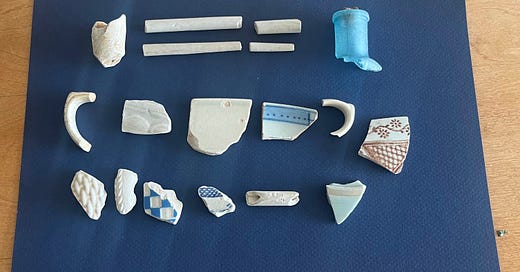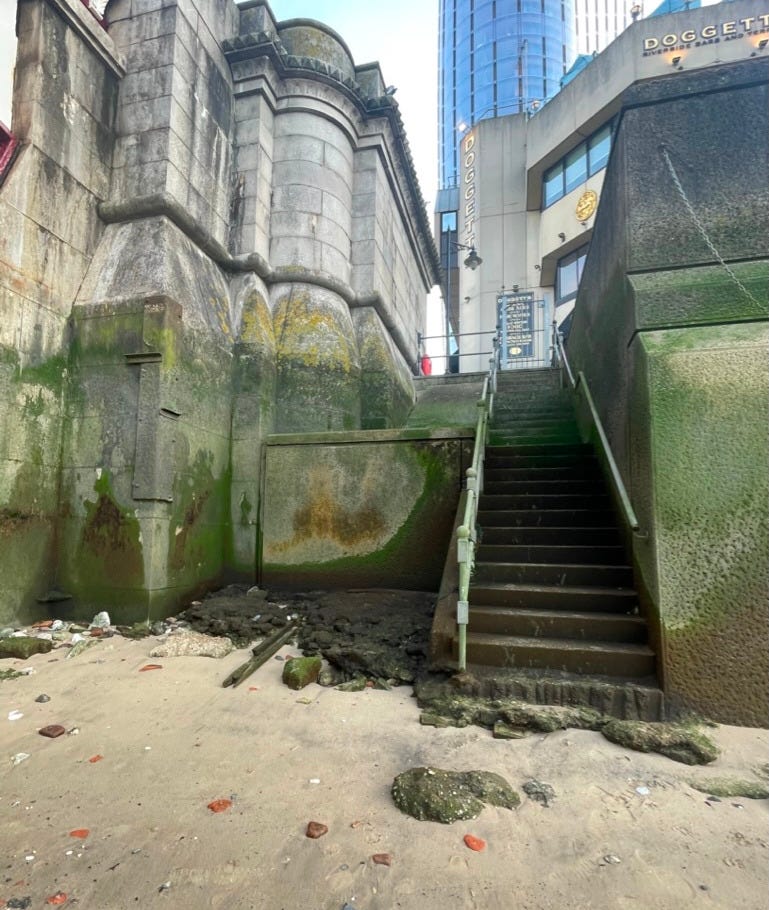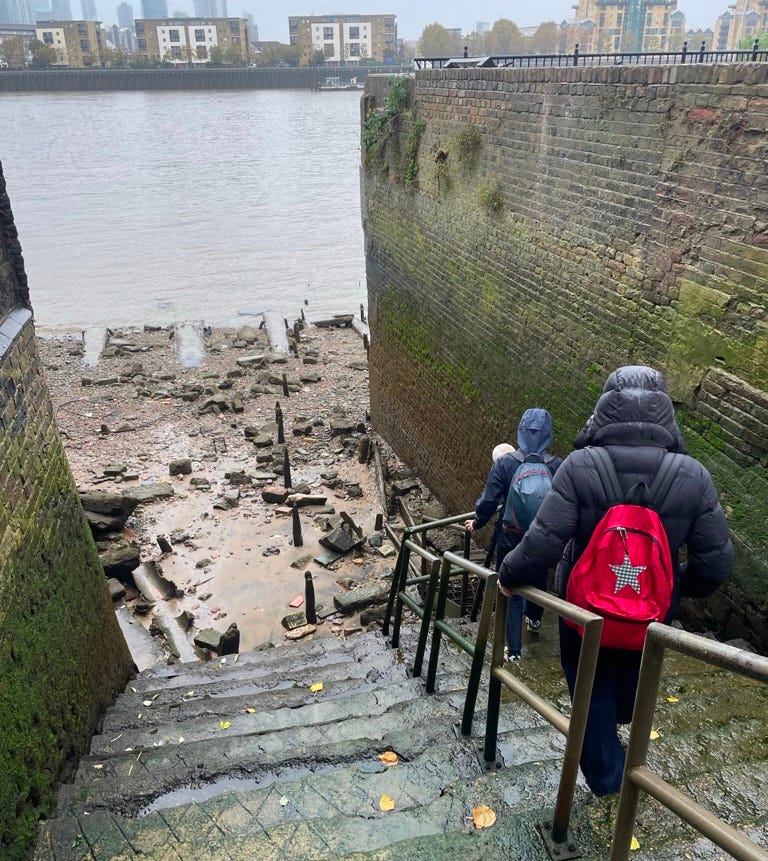My father sometimes reminds me that when I was four or five I found a loose dollar bill on the sidewalk and then walked around for weeks with my head down, looking for more. It’s not that I’m greedy (or greedier than normal) it’s just that I like finding things, especially trinket-like things I can hoard in my apartment. I’ve had this crow-like tendency for some time.
In high school, I realized that you could lift up the cast-iron water covers, essentially little manhole covers about ten inches in diameter, out of the pavement and just walk away with them. I still use one as a glorified coaster on my side table. In Rome this summer, I was lazing in a field outside the Baths of Caracalla after admiring its ancient floor mosaics. Petting the grass as I sat there, my finger ran across something cold and smooth for just a moment and I instinctively dug my finger into the dirt and grabbed the object — a quarter-sized stone, glazed on one side and rough on the other, vaguely rectangular, and with the faintest impression of a blue line going across it. An ordinary rock with a streak caused by some natural geological thingy… or a stray mosaic tile? I chose to believe the latter and stuck it in my pocket, and now it sits on my mantle looking pretty unremarkable to everyone but me.
In the Tate Modern, I was smitten by the Thames Display by Mark Dion, a literal cabinet of curiosities of human bones, oysters, bottles, and bits of teacup pulled out of the Thames River by Dion and team. When I returned to London for planning school I discovered mudlarking - the act of searching a riverbed for treasures. The Thames is unique among urban rivers for its incredibly low tides, great expanses of the riverbed called the “foreshore” are exposed daily. Mudlarking is now technically illegal because people kept finding and pocketing fantastic discoveries digging around in the muck — Roman coins, sixteenth-century jewelry, an entire sword. This article from Bloomberg quotes an avid mudlarker: “You’re either a person who can spend five hours looking at mud and not get bored or you’re not.”
The Thames, like most urban rivers, used to be much more accessible to everyday people who relied on it for trade, transit, and recreation. Dozens of stone staircases remain along the embankment fenced off. The longer I spent in the city the more tempting they became.
When I finally gave in to mudlarking it was bad for my studies. I used to bring school work to the cafe at the BFA on the Southbank so I would be close to the Thames, moving words around on a page and reading the same paragraph on comparative approaches to urban regeneration before running out the door twenty minutes before low tide. I’d hustle down the embankment to Gabriel’s Wharf and skip over the waist-high fence blocking the foreshore steps. To an experienced mudlarker this is probably a very amateurish spot to dig since it’s so central, but it was convenient and, across several months of visits, pretty fruitful. The first time I did this I almost immediately found the stem of a clay pipe, its bone-white cylinder standing out from the grey and brown rocks. When I got back home I burst in on the woman I was living with and produced my little pipe end. “Can you BELIEVE that some GUY from the eighteenth century had this in his MOUTH?” She politely said something similar to what you’d say to a child showing you a bug they’d caught — great job buddy! Big day for you! Later she very nicely got me a book about mudlarking for my birthday.
Twice I ended up on the foreshore embarrassing myself in front of colleagues. In Barking my very patient partner at planning school waited while I freed a very ordinary piece of porcelain from the muck with my fingernail and got sand on the notes we had been compiling. In Deptford for another project, our local contact Malcolm had been leading me and a group of planners on a tour, explaining to us that Deptford was the site of the former Royal Dockyards and pointing out specific breeds of cobblestone used by the Tudors and whatnot. I sensed a kindred spirit. At one point we passed a set of absolutely delicious-looking foreshore steps and I leaned over and asked Malcolm what was down there, knowing that with some gentle suggestion, I could probably direct our group onto the foreshore. The steps were incredibly slippery and someone had scrawled “BORIS JOHNSON IS A NONCE” across the bottom step in white paint.
Carefully, we descended onto the foreshore and Malcolm picked up a water-worn brick, explaining that this was probably a Victorian-era brick from one of the warehouses that used to line the river. I turned the brick over several times in my hands before I realized everyone was politely waiting for me to finish. I invented some comment about the quality of the retaining wall, or the wood piling of the nearby pier to try and cover up my selfish brick-fondling.
Sometimes when I was on the foreshore I’d see white-haired ladies with gloves, gardener’s trowels, rubber boots, and plastic buckets. These were the pros. I passed one of these women on the foreshore under Waterloo Bridge and asked her if she’d had anything good that day. “No, afraid not today,” she told me without a smile. I had a strong urge to go up and look in her bucket. Several times when commuting by bike over various bridges I would look onto the foreshore and see a septuagenarian on their hands and knees with a bucket and a trowel. I’d stop and squint at them digging little holes, trying to make out from their body language if they found anything good and wondering if I’d be late if I jumped down there myself. I really wanted to find a Roman coin.
The pinnacle of my mudlarking obsession was when I actually proposed a “safe mudlarking zone” for a patch of the Thames embankment my old consulting firm was working on. I imagined a sweeping set of stairs descending into a marked-off area that would reveal itself at low tide. Educators could take kids onto the foreshore to muck around. I took up expensive consultant minutes pontificating about mudlarking on various Zoom calls. Our client was not opposed, but the planners at the local council said it was a non-starter. I still think this is a good idea.
Where is all this going? Probably not in a healthy direction. I’m worried I’ll end up as one of those guys on the beach with a metal detector and leathery skin. My latest thing has been checking the auction website the NYC municipal government uses to get rid of old stuff. I’ve seen police cars, 20 office chairs with missing wheels (must be bought as a lot), and a set of commemorative pens someone gifted to Rudy Giuliani. The MTA has an annual subway paraphernalia sale where transit nerds can come and bid on wooden benches, station signs, and entrance lights. I haven’t ever pulled the trigger on a municipal auction, but the fact that I’m looking is…. a bad sign. Alarm bells go off in my head when I browse these sites “DO NOT DO THIS, TURN BACK. DO LITERALLY ANYTHING ELSE WITH YOUR TIME AND MONEY.” A buddy of mine who worked for the City arranged the sale of an old Staten Island ferry to Pete Davidson for 280,000 dollars. I gave him shit for not telling me about it first.
I’m afraid they’ll end up finding me dead and alone in an apartment full of urban detritus, discarded street signs, manhole covers, clay pipes, stacks of business cards, and matchbooks from restaurants I’ve been to. But there are worse eccentricities you could have. Cities are always shedding stuff. You shouldn’t litter, but if you do hopefully someone in 2100 will find your empty vape cartridge or whatever and think it’s amazing.
If you liked this, consider sharing or upgrading to a paid subscription to support the considerable time it takes to write and research these posts. Thanks for reading.








Wow a person after my own heart…my version is tidepooling and estate sales
This is a whole new (and wonderful!) take on the urban practice of trash-to-treasure. In exchange for (to give just one example of treasures I've found in the trash) the beautiful, fully working Art Deco lamp that now illuminates my living room, I enjoy discarding my own large items on the curb, walking around the block once, and finding them gone. But mudlarking . . . wow!